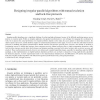Free Online Productivity Tools
i2Speak
i2Symbol
i2OCR
iTex2Img
iWeb2Print
iWeb2Shot
i2Type
iPdf2Split
iPdf2Merge
i2Bopomofo
i2Arabic
i2Style
i2Image
i2PDF
iLatex2Rtf
Sci2ools
103
click to vote
JPDC
2006
2006
Designing irregular parallel algorithms with mutual exclusion and lock-free protocols
Irregular parallel algorithms pose a significant challenge for achieving high performance because of the difficulty predicting memory access patterns or execution paths. Within an irregular application, fine-grained synchronization is one technique for managing the coordination of work; but in practice the actual performance for irregular problems depends on the input, the access pattern to shared data structures, the relative speed of processors, and the hardware support of synchronization primitives. In this paper, we focus on lock-free and mutual exclusion protocols for handling fine-grained synchronization. Mutual exclusion and lock-free protocols have received a fair amount of attention in ting accesses to shared data structures from concurrent processes. Mutual exclusion offers a simple programming abstraction, while lock-free data structures provide better fault tolerance and eliminate problems associated with critical sections such as priority inversion and deadlock. These syn...
| Added | 13 Dec 2010 |
| Updated | 13 Dec 2010 |
| Type | Journal |
| Year | 2006 |
| Where | JPDC |
| Authors | Guojing Cong, David A. Bader |
Comments (0)

